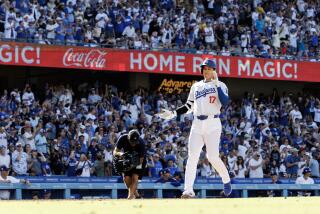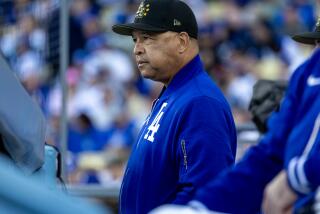BASEBALL / ROSS NEWHAN : Perez’s Usefulness to Reds Ended Before the Season
Tony Perez insists he was used by the Cincinnati Reds.
Believe it.
There is no other way to look at his firing as manager after only 44 games.
If ever a manager was hired to be fired, it was Perez. If there was ever a set up, this was it.
The Reds have a $42-million payroll, baseball’s biggest.
They had aggressively prepared for the new season by signing free agent John Smiley and trading for Kevin Mitchell and Bobby Kelly. They were thought to be a competitive match for the Atlanta Braves in the National League West.
Do you entrust that hope and commitment to a first-year manager whose communication and motivational skills had never been tested under fire?
Do you hire former managers Davey Johnson, Bobby Valentine and Jack McKeon in consultant and scouting roles with no thought about having them on hand and in place if you have to give a quick hook to Perez?
Do you ultimately expect the public, and players, to believe that Perez is to blame for a 20-24 record when pitchers Smiley and Tim Belcher are a combined 2-10, when Mitchell, Kelly and Barry Larkin have all been playing hurt, when first baseman Hal Morris and closer Rob Dibble have been out all or most of the season with injuries?
The hiring of the popular Perez, as much a Cincinnati landmark as Fountain Square, was designed for one thing and one thing only.
It was hoped his appointment would help dilute the firestorm then brewing around owner Marge Schott for her racial and ethnic slurs.
If it turned out that he could handle the job, if he could be a tough leader in contrast to his easy-going style, it would be a plus.
Unfortunately for Perez, it was never the plan to give him a true test if the Reds showed signs of slipping out of the race--no matter where the blame lay.
An ambitious Jim Bowden, dedicated to making a name and establishing his credentials as baseball’s youngest general manager, pulled the trigger on Perez with the Reds 9 1/2 games out.
Only the most naive would believe he didn’t have Schott’s blessing despite her suspended status. Bowden gave Perez the news by phone and then tried to say he learned to fire by phone while climbing the Pittsburgh Pirates’ organizational ladder. That claim angered Pittsburgh executives to the same extent that Cincinnati players were angered by the Perez firing.
In the long run, of course, the Reds might emerge as a better team with their experienced and successful new manager, and Bowden can say that was the whole point.
Johnson never should have been made a scapegoat by the New York Mets early in 1990 after winning 90 or more games in his first five seasons as their manager and establishing a win percentage of .588, fifth best in baseball history.
The Mets’ subsequent firings of Bud Harrelson and Jeff Torborg illustrate that their problems go beyond the manager’s office. Johnson never should have left and never should have had to wait three years before returning to a major league dugout.
But does that justify the firing of Perez after 44 games? Can any manager be judged in that time?
No way, said Detroit Manager Sparky Anderson, but Bowden obviously felt differently. He had begun to openly question Perez’s strategy and was unwilling to let Perez learn from his mistakes.
After all, Perez had satisfied the Reds’ strategy in hiring him even before they played the first of those 44 games.
SIGNS OF SUMMER
It’s heating up.
--Willie Wilson questions the attitude and approach of Chicago Cub teammates Dwight Smith and Derrick May, scuffles with May in the clubhouse shower, threatens to quit, and is talked out of it by Manager Jim Lefebvre.
--Terry Pendleton, unofficial captain of the Atlanta Braves, walks off the field in Cincinnati after Marvin Freeman fails to throw at Belcher during the seventh inning of Wednesday night’s game after Belcher had earlier hit Deion Sanders with a pitch.
Sanders would later say he didn’t think Belcher had intentionally thrown at him. However, that didn’t alter Pendleton’s apparent belief that close friend Sanders hasn’t been getting the respect of many of his teammates who feel the organization bent too far in rewarding Sanders with a three-year, $11-million contract after his three-week walkout.
Sanders told the Atlanta Constitution that he was touched by Pendleton’s response. “He has always been a good friend to me,” Sanders said. “Terry told me if I had been out one more week he was going to wear my number on his (uniform) sleeve.”
The Braves responded mildly to their third baseman’s inappropriate walkout in the middle of a game, suggesting he would be fined but not suspended. Many Atlanta insiders think there was more to Pendleton’s action than a demonstration of support for Sanders.
They say it illustrated his frustration with a .204 start and his lingering unhappiness with the Braves’ spring refusal to discuss a contract extension in the aftermath of their big money signings and re-signings of pitchers Greg Maddux, Tom Glavine and John Smoltz.
In rejecting Pendleton’s multiyear thoughts, the Braves further antagonized him by expressing concern about the weight he is now carrying, an ongoing theme during his opening slump. All of that, they say, influenced Pendleton’s actions in Cincinnati.
“What Terry did can’t be tolerated,” said Manager Bobby Cox, who was shown up by Pendleton’s unexcused departure, “but everybody has a breaking point at times, and Terry simply reached his. I’m confident it won’t happen again.”
WHO’S IN CHARGE
Baseball’s complicated and revolutionary new TV partnership with ABC and NBC, according to Dodger President Peter O’Malley, re-emphasizes the need for a “strong, independent, outside commissioner” to show the way in difficult issues of this type.
“We need someone in the New York office to provide that leadership and voice,” O’Malley said.
He added that he didn’t believe the process of restructuring the office and identifying a candidate “should have taken this long.” Asked why it has, he said, “I don’t know. You’ll have to ask Bud Selig.”
Selig, owner of the Milwaukee Brewers and chairman of the executive council, maintains that it is simply a complicated, time-consuming process that needs to be done right.
Perhaps, but eight months after the forced resignation of Fay Vincent, the true story is that the consensus-minded Selig can’t or is unwilling to resolve a split among ownership, with many still unwilling to hire a commissioner while Richard Ravitch attempts to negotiate a new labor agreement.
Those holding that view believe a commissioner could become a third-party impediment to Ravitch, who is president of their Player Relations Committee.
Impediment? After voting in December to reopen labor talks a year early so that Ravitch would have a full year to forge a new compensation system, the owners have allowed almost half a year to drift by without a concrete proposal to take to the union.
They have yet to really even debate the first step in that, which is the potential big market-small market war over enhanced revenue sharing among themselves. They are the impediment to the impediment.
CURTAIN CALL
Knee injuries disrupted his statistical parade and restricted his availability during the last two of his 16 major league seasons, but the class that distinguished Dale Murphy’s career never changed. He was the same from start to finish.
“If I ever come back,” said former Atlanta teammate Phil Niekro, speaking of a second life, “I’d want it to be as my father, my brother or Dale Murphy. It doesn’t get any better than Murf.”
Maybe not, but there may be others on the way. A whole team of Murfs, in fact. Dale and Nancy Murphy have seven sons, and are expecting their eighth child.
No wonder Nancy couldn’t meet her husband at the Atlanta airport after his retirement announcement Thursday. Sean, 10, had Little League practice.
More to Read
Go beyond the scoreboard
Get the latest on L.A.'s teams in the daily Sports Report newsletter.
You may occasionally receive promotional content from the Los Angeles Times.










